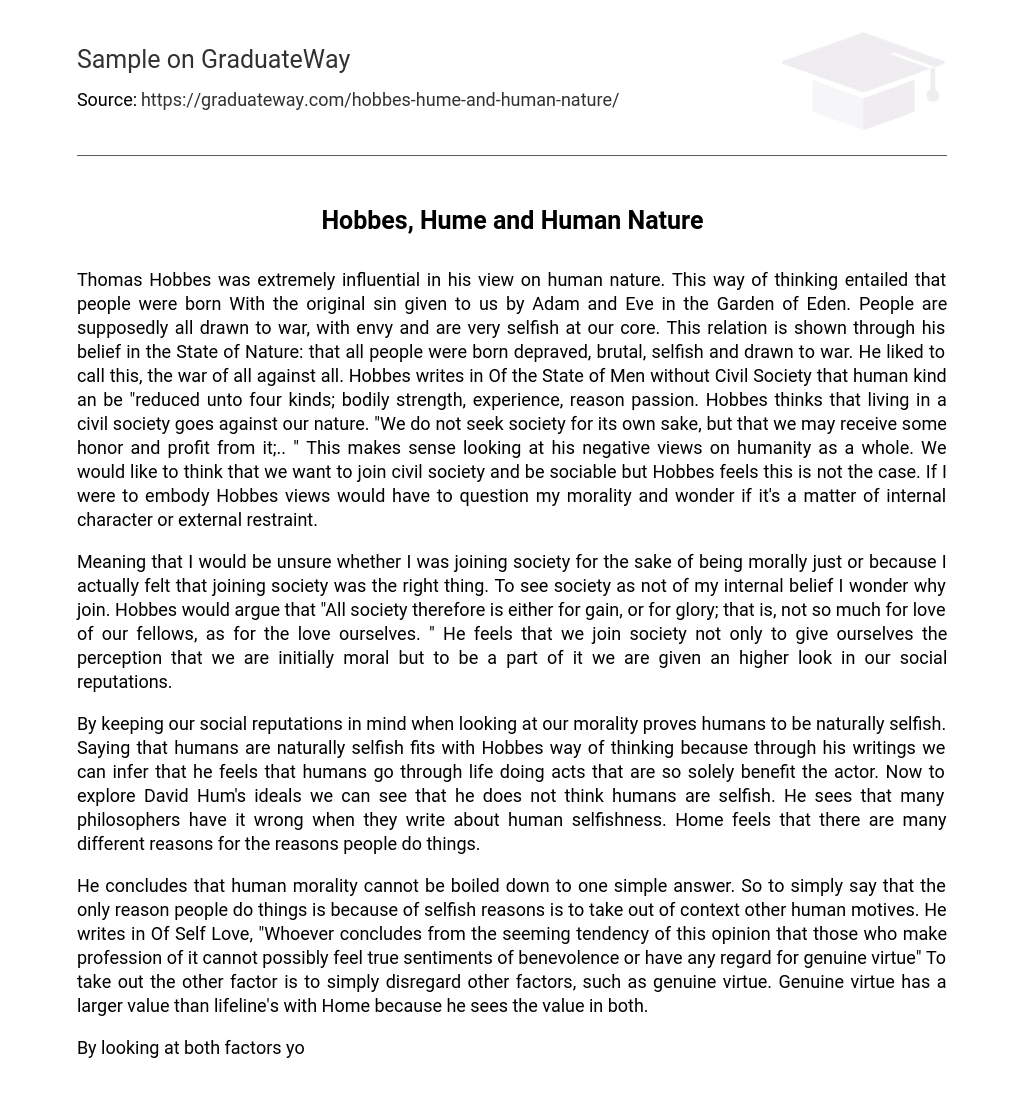Thomas Hobbes was extremely influential in his view on human nature. This way of thinking entailed that people were born With the original sin given to us by Adam and Eve in the Garden of Eden. People are supposedly all drawn to war, with envy and are very selfish at our core. This relation is shown through his belief in the State of Nature: that all people were born depraved, brutal, selfish and drawn to war. He liked to call this, the war of all against all. Hobbes writes in Of the State of Men without Civil Society that human kind an be “reduced unto four kinds; bodily strength, experience, reason passion. Hobbes thinks that living in a civil society goes against our nature. “We do not seek society for its own sake, but that we may receive some honor and profit from it;.. ” This makes sense looking at his negative views on humanity as a whole. We would like to think that we want to join civil society and be sociable but Hobbes feels this is not the case. If I were to embody Hobbes views would have to question my morality and wonder if it’s a matter of internal character or external restraint.
Meaning that I would be unsure whether I was joining society for the sake of being morally just or because I actually felt that joining society was the right thing. To see society as not of my internal belief I wonder why join. Hobbes would argue that “All society therefore is either for gain, or for glory; that is, not so much for love of our fellows, as for the love ourselves. ” He feels that we join society not only to give ourselves the perception that we are initially moral but to be a part of it we are given an higher look in our social reputations.
By keeping our social reputations in mind when looking at our morality proves humans to be naturally selfish. Saying that humans are naturally selfish fits with Hobbes way of thinking because through his writings we can infer that he feels that humans go through life doing acts that are so solely benefit the actor. Now to explore David Hum’s ideals we can see that he does not think humans are selfish. He sees that many philosophers have it wrong when they write about human selfishness. Home feels that there are many different reasons for the reasons people do things.
He concludes that human morality cannot be boiled down to one simple answer. So to simply say that the only reason people do things is because of selfish reasons is to take out of context other human motives. He writes in Of Self Love, “Whoever concludes from the seeming tendency of this opinion that those who make profession of it cannot possibly feel true sentiments of benevolence or have any regard for genuine virtue” To take out the other factor is to simply disregard other factors, such as genuine virtue. Genuine virtue has a larger value than lifeline’s with Home because he sees the value in both.
By looking at both factors you can identify motives of morality easier. Home sees morality at a bigger scale than Hobbes. Hobbes attempts to break down morality into a simple explanation which Home has expressed problems with. “All attempts of this kind have hitherto proved fruitless, and seem to have proceeded entirely from that love of simplicity which has been the source of false reasoning in philosophy. ” He says that simplicity is actually a bad way to go about looking at different philosophical questions because it mutinous to be proven false.
This is where his problem with philosophical reductionism and probing for hidden motives comes into play. There is no right or wrong answer to the question of what is the origin of human nature or what drives our motives, there can only be theories in which we try and find the answer. I personally feel that Hobbes is wrong and that we are drawn to society. We can see now that humans feed off connection. You can see examples in how when early cities began to form people flocked to them and began to abandon farmlands to live in busy, crowded cities.
While yes, there is the occasional introvert who would require a quieter setting away from all people, people are usually drawn to each other. This is where see more relation to Humus way of thinking in that you can’t give a simple explanation to a large question. There is no simple explanation as to why people are motivated to do certain things. Human nature is extremely complex and one answer will not suffice. Hobbes and Home both have convincing arguments but where Hobbes arguments fall short Home is there to pick up the pieces with a better understanding of human nature.





